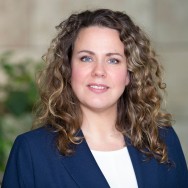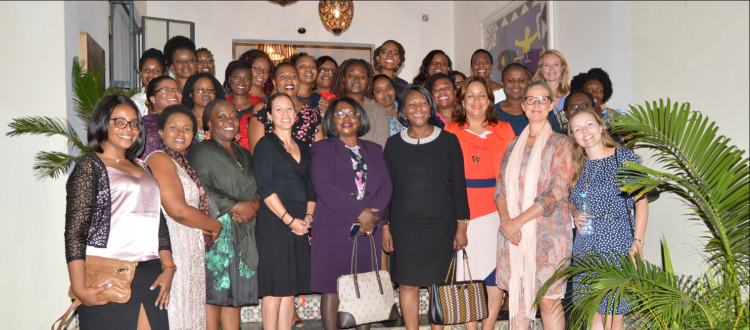 |
| Senior gender finance advisor Saskia Vossenberg |
Female entrepreneurs are a powerful force in the global economy, with significant untapped business potential and plenty of ambition to grow. Access to finance still is the single biggest constraint facing this group. Women are far less likely than men to access the financing needed to start or grow a business: 68 percent of women-owned small and medium enterprises (SMEs) in emerging markets have unmet credit needs (GBA, 2018). In Kenya for example, 48 percent of business owners are women, yet they have only 7 percent of formal credit (OECD, 2017).
Looking at these figures, it’s no wonder female entrepreneurs report having low trust in banks. In fact, research shows that globally 73% of women are unsatisfied with how they are being served (GBA, 2018). “Banks are not interested in seeing me grow,’ is what I often hear from female entrepreneurs,” says FMO’s senior gender finance advisor Saskia Vossenberg. “Women can experience difficulties in getting appointments or having to rely on male relatives to set up a meeting with a loan officer. For those that do get appointments, often products are offered that are not suited for their growth ambitions. Either the ticket size is way above, or way below what female entrepreneurs require, and the tenure too short and the interest rate too high or the collateral requirement impossible to meet.”
International Women’s Day provides the perfect opportunity to focus on how we are working with our client banks to reduce the gender inequality gap in finance. Vossenberg is positive about the progress we are making: “Momentum is building, and our gender lens is starting to have an impact at the local level. We now have tools in place to make sure that our investments are contributing to improving the lives and businesses of female entrepreneurs. Women don’t need (pink) financial products, they need combinations of tailored financial and non-financial solutions.”
Changing lenders’ habits
To achieve gender equality in access to finance, there is a role for lenders to rethink their own habits. “It is not just about better marketing to women, but also about having a gender-smart value proposition and the business model to deliver it,” says Vossenberg.
To achieve real impact on Sustainable Development Goal 5, the empowerment of all women and girls, and gender equality, it is important to reduce country-specific inequalities that block female entrepreneurs from accessing and using capital to grow their businesses and improve their livelihoods. And financial institutions, both in the developed and developing world, play a key role to make this happen.

| Raising awareness and making finance work for female entrepreneurs can be done in many ways. In Zambia, we organised the Female Focus on Financial Inclusion Initiative together with the Bank of Zambia, Norfund, Arise and Future Women X. The program brought together bankers and female entrepreneurs to discuss constraints. Afterwards, the entrepreneurs could pitch their business ideas directly to an audience including the CEO of 5 Zambian bank and the (female) Minister of Finance. Watch the aftermovie of this event by clicking here. |
Moving from selling capital to selling impact on SDG 5
Banks are often unaware of the many additional constraints women business owners face. Women are not only held back by poor access to capital and failing infrastructure: they deal with gender-specific regulations, social norms and responsibilities which constrain their decision-making power and bind their control over resources and market opportunities that are needed to realize growth. Like having to manage households and raise children while simultaneously building their business. Or needing permission and the signature of a husband to sign for a loan.
“We realized that our client banks experience challenges around serving female entrepreneurs,” says Vossenberg. “That is why we have developed a gender finance value proposition consisting of a customized tool box of financial products and capacity development to help our clients be more gender-smart, and reach and serve women better.” We work with a network of impact partners to assist our clients, for example The Global Banking Alliance (GBA) for Women, a worldwide consortium of best practice banks serving the women’s market and experienced in addressing these challenges.
Asking the right questions, delivering the right solutions
“It’s really all about asking the right questions and exploring innovative financial solutions,” says Vossenberg. “Taking on a gender lens helps us do that. We developed tools to assess how lenders’ systems, products or practices are (intentionally or unintentionally) biased towards men’s or women’s situations or needs. And we also help with understanding the local context, the obstacles facing women-owned businesses and how to meet their specific needs. When we are on Due Diligence or a business development trip for example, we proactively seek for opportunities to serve women better. We have a dialogue on gender equality within the bank and connect to other actors outside the bank, like NGO’s, women business incubators and women business networks to understand the situation on the ground and seek new partnerships.”
Stepping up the game
Vossenberg is optimistic about the progress Development Finance Institutions (DFIs) are making in the field of gender finance, but also sees room for improvement. Specifically, there are two key challenges in ‘stepping up our game’.
The first is that legal, regulatory, and cultural barriers mean most female entrepreneurs operate small but growing businesses in the upper tiers of the informal economy. This vital force in the economy is beyond microfinance, but not yet eligible for SME finance. How to invest in this segment and address specific needs in terms of capacity development, smaller ticket sizes, flexible interest rates and alternative underwritings?
A second challenge is the limited gender-smart market data available, making it difficult for banks (and FMO) to assess market needs and potential, portfolio performance and impact in the micro, small, and medium enterprise (MSME) segment of the women’s market. “As DFIs we need to collectively develop our capacity and that of our clients to collect more and better gender-disaggregated data. This would help us understand the business potential and to track our performance on truly impacting the lives and businesses of female entrepreneurs.”
International Women's Day is a global day celebrating the economic and political achievements of women - while also marking a call to action to accelerate impact on SDG 5. FMO is excited to continue to contribute to a gender-inclusive financial sector that partners with female entrepreneurs in realizing their growth ambitions, and partner with like-minded others to accelerate impact.



